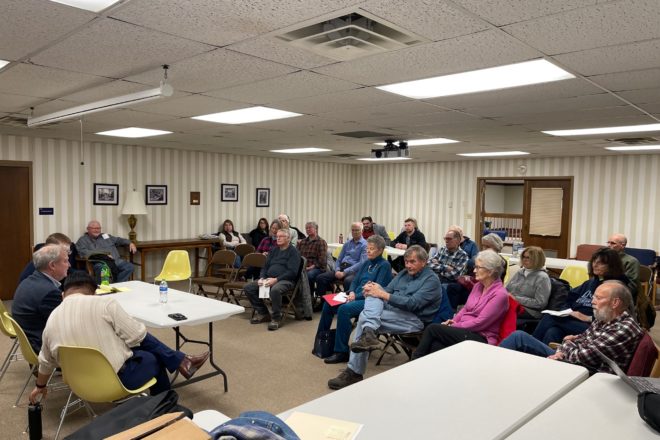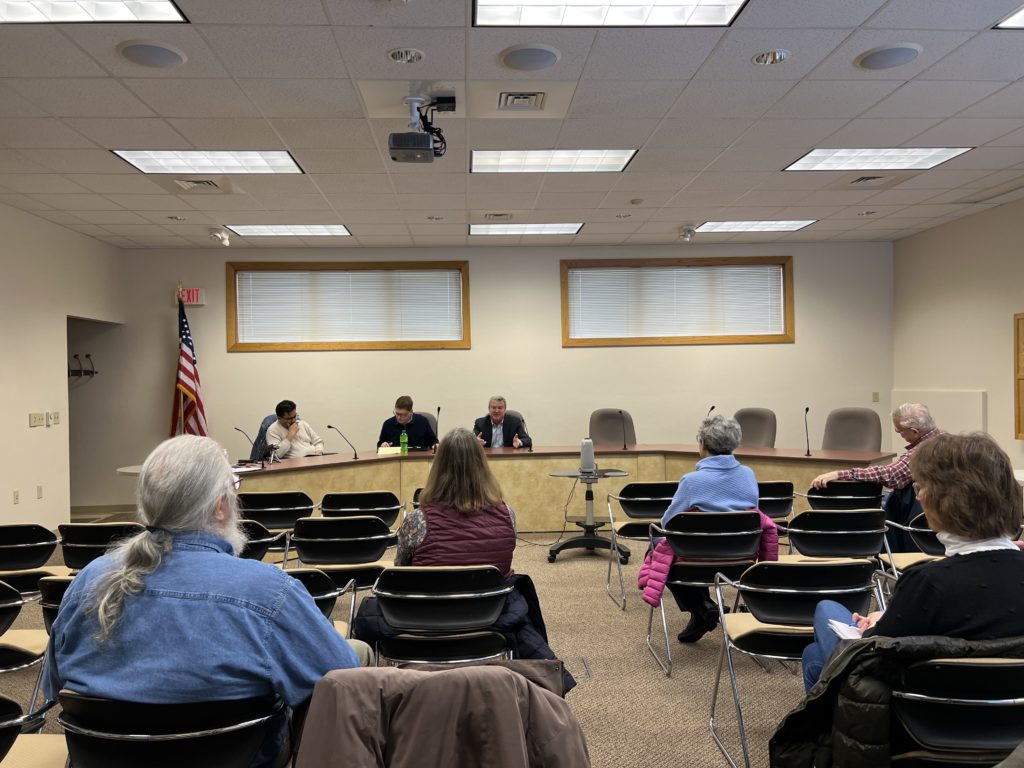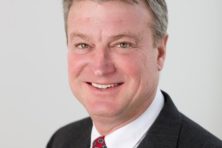Wide Range of Topics Brought to Rep. Kitchens Listening Sessions
- Share
- Tweet
- Pin
- Share

Rep. Joel Kitchens (R-Sturgeon Bay) held two listening sessions in Door County this week to learn what’s on constituents’ minds as the budget process gets rolling in Madison.
Gov. Tony Evers kicked off that process in February with the release of his 2023-25 budget plan, which spends $103.8 billion over two years. Republicans – who control both the state Assembly and the state Senate – have promised to start their own budget from scratch on the way to final approval by June 30, the end of the current biennium.
“It’s really not a realistic budget,” Kitchens said during the Sturgeon Bay listening session March 6. “It’s not even a good starting point for negotiations.”
The listening session in Sturgeon Bay drew about 20 people, and the one immediately prior to that in Fish Creek about 10. Kitchens also traveled to Algoma that day for a third session.
Education
Kitchens, who was appointed chair of the Education Committee this year, said the $2.6 billion increase in Evers’ budget for K-12 public school funding is too high. He does anticipate a bump in spending for schools after lawmakers used federal COVID-19 relief money that poured into schools as justification for not increasing school spending in the current budget.
“Knowing that, there will be an increase,” Kitchens said. “I hope my colleagues recognize that.”
Kitchens talked at both listening sessions about the nonpartisan bill he’s working on that would change how public schools teach reading in order to improve literacy rates. It also seeks to close the achievement gap: Wisconsin has the widest disparity in math and reading scores among Black and white students of any state in the nation.
Although residents didn’t bring up education issues in Gibraltar, education dominated the conversation in Sturgeon Bay, with participants asking for lower student-teacher ratios, an increase in the per-child funding formula, and more funding for special education and mental-health issues.
Sue Todey, a Sevastopol School Board member, thanked Kitchens for his emphasis on reading, citing studies that have shown that “the pipeline to the prison system” is poor reading skills.
“Two-thirds of students not reading at grade level by fourth grade will end up in jail or on welfare,” Kitchens said.
He and others in Sturgeon Bay stressed the importance of reading to children at two and three years old to expose them to words. The government can’t craft a bill that addresses that – “the government can’t raise peoples’ kids for them,” Kitchens said – but awareness and child care programs are increasingly addressing the need to expose young children to language.

Local Government Levy Caps and State Aid
A need for increasing state aid to local governments arose at the Sturgeon Bay session. (Evers’ budget would devote 20% of the state sales tax to aid local governments.) Kitchens said he hears “a lot that local governments are struggling” and that there would be “more money in the budget this year for roads.”
In Gibraltar, a participant asked about lifting the cap that restricts how much local governments can increase the property-tax levy. Kitchens said he was open to doing so, but he said it would be difficult to pass, given that residents like the authority the statute gives them to decide when a town wants to override the levy cap.
“Usually the public likes for you to come ask them if you’re going to spend their money,” Kitchens said. “They don’t want their taxes increasing based on a few people [on the town board] voting on it.”
Room Tax, Tourism and Short-Term-Rental Properties
Room-tax revenues were brought up in both Gibraltar and Sturgeon Bay. In Gibraltar, a participant said more money should be allocated to making sure municipalities were equipped to handle the influx of tourists, especially by investing in affordable housing for workers.
In Sturgeon Bay, Linda Wait, who is also a Sevastopol Town Board supervisor, asked for a change in the statute so that a higher percentage of room-tax revenue is going to municipalities to maintain the places tourists visit and use. The statute currently requires that 70% of room-tax revenue be used for promoting tourism, with 30% returning to local municipalities.
In Gibraltar, a participant asked that local governments be allowed to limit the number of licenses that could be issued to short-term-rental properties, as other states allow. Kitchens said local governments should first regulate what they could, such as specifying minimum stays. Only the Town of Sevastopol has done that in Door County.
“That changes the market drastically,” Kitchens said. “I would say, do those things, and if there’s still a problem, then you go to the state.”
Environmental Issues
In Gibraltar, participants asked for increased funding for the state’s Knowles-Nelson Stewardship Fund and asked for state support of generative farming practices, loosened restrictions on solar gardens, encouragement of composting efforts and a continued focus on water quality.
In Sturgeon Bay, participants were concerned about PFAS compounds (per- and polyfluoroalkyl substances) in the water.
“We’ve been working on that, but really, the federal government has to come up with the standards,” Kitchens said. “It’s really hard for a state to do that. There’s just so much we don’t know yet.”
During both listening sessions, residents brought up concerns with phosphorus entering surface waters from agricultural practices, and at both sessions, Kitchens cited specifics on the progress made during the past five years.
“Algal blooms are still much more than we want, but we’re definitely doing better and our water has improved,” he said.
Arts Funding, Reproductive Rights and Driver’s Licenses for Immigrants
Brian Kelsey, Peninsula Players Theatre’s executive director, asked during the Gibraltar session that the legislature preserve the money Evers has allocated in his budget for the arts. (There’s a $552,500 increase in Evers’ budget for the Wisconsin Arts Board over the biennium, and $100 million for the Artistic Endowment Fund, with interest earnings used to support the arts across the state. Evers has also included funding in his capital budget for building projects in the arts, including $1 million in cash for Peninsula Players’ dormitory upgrade.)
Participants in Sturgeon Bay asked for Medicaid expansion, a change to or a referendum on Wisconsin’s abortion law, and allowing the issuance of driver’s licenses to immigrants upon whose labor Wisconsin industries – such as dairy and services – rely. Eighteen other states issue driver’s licenses to illegal immigrants.
“Personally, I believe a driver card would be beneficial, as long as they understand it doesn’t mean they have citizenship and can’t vote,” Kitchens said.
Another person asked that Wisconsin change its election laws to allow workers to process ballots earlier than Election Day. Kitchens said he supported allowing ballots to be counted the day before the election during business hours with observers present.

